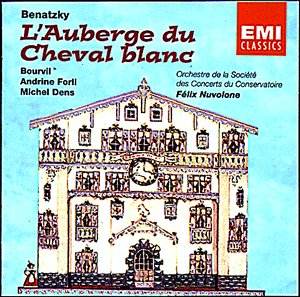In its original 1930 form, Im weissen Rössi
(The White Horse Inn) played to Berlin audiences for a respectable
416 performances. From Benatzkyís German original the work was adapted
both for the French and British stage. The White Horse Inn was
one of those shows with a very dynamic existence. One of the most famous
numbers to English-speaking audiences, 'Goodbye' wasn't in the original
score but was added by Stolz for the London production. This song was
originally known as 'Adieu, mein kleiner Gardeoffizier'.
In Britain, The White Horse Inn became a favourite
with amateur operatic societies up to the 1960s. Its immediately accessible
music and simple, trivial plot were perhaps the secret of its success.
Some of the numbers in the Chappell vocal score were altered from the
original German and it is the Chappell edition which is used for this
recording. Certainly, Leopold's number 'Zu'schaun, kann inett' only
gets a brief hearing in one of the finales of the Samuel French/Chappell
version.
Ralph Benatzky, is little heard of and indeed
the CD notes donít help. He came from Moravia (Czechoslovakia) and conducted
at a Munich theatre in 1910. He went on to write songs and music for
cabaret (in Vienna) and a new genre revue-operetta of which White
Horse Inn is the best remembered. His forte was in arranging, and
the preceding work, Casanova (1928), was basically an adaptation
of melodies from Johann Strauss IIís music. (My research does not reveal
any professional training in music composition and judging from his
light-weight output this seems unlikely.) Casanova was well received
by the public and paved the way to The White Horse Inn. Although
also extremely successful, Benatzky cannot take all the credit for he
didnít write all the musical numbers. Lubbock's Complete Book of
Opera, tells us that additional numbers were written by Bruno Granichstaedten,
Robert Gilbert, Robert Stolz and Hans Frankowski. Benatzky/Stolz orchestrations
if used in this recording tend to lack substance and their texture is
generally thin, but one has the feeling that the arrangements used are
post-war.
An overture is replaced by an extended prelude despite
what the track notes tell us. From my memory of stage performances in
England in the 1960s, the British (Samuel French/Chappell) editionís
prelude to Act 1 was quite magical, a sort of Peer Gyntian daybreak
with birds twittering (flutes playing the yodelling singing line which
exists in the French version). The opening then gathers momentum and
eventually breaks into the maidsí duet. But in this French recording
there is much strident pseudo-Tyrolian yodelling from the start, which
severely interrupts the flow of musical romanticism. The French arrangement
may work well on stage but since the yodelling is harsh the British
version is musically superior. EMIís brief notes do not explain the
situation except to state that the Chappell edition was used for the
recording. Throughout there are some good chorus numbers, particularly
the medley and reprise concerning a change in the weather. If the track
list is correct and matches the French version it seems strange that
Act I ends on a duo with swinging rhythm rather than the natural break
after the reprise and weather chorus which provided a Busby Berkeley
style finale to Act I in the British edition. The EMI listing has this
item listed as the third number in Act II.
Of the soloists Andrine Forli (Josépha) has
a light lyrical style perfectly suited to the part. But Bourvil (Leopold)
is another matter: someone who may have an excellent stage presence
will not necessarily come over well in a recording, and this is the
problem. Kurt Gänzl reckons that to hear Bourvil on the French
recording is 'to hear musical comedy at its most irresistibleí,
but I donít agree. Gänzl reckons that this recording of 'L'Auberge
de Cheval blanc' is superior to any of the German recordings for this
reason. Bourvilís voice maybe strong, but it is not musical. He is reminiscent
of a Maurice Chevalier whose singing was marred by a thick resonant
timbre. Since he sings in many of the numbers his choice for the recording
is a disappointment. The castís other supporting singers are good and
welcome: of these, Jacques Herrieux (Emperor) and Michel Dens (Florès)
are memorable. Dens sang in EMI Pathéís later production of Véronique
in 1969. His rich warm tone with elegant phrasing and strong delivery
ideally fits the part. At times the chorus sounds barely adequate because
diction is woolly and consonants at times totally missing (this may
have been caused by poor miking, though.)
It helps to be able to follow the French dialogue (though
this is tracked separately so that a CD player may be programmed to
play the music alone). Good sound effects add realism to the piece where
stage sounds are heard and sleighs retreat into the distance.

![]() Bourvil, Andrine Forli,
Michel Dens
Bourvil, Andrine Forli,
Michel Dens ![]() EMI 7243 57407021 [CD1
48.46 CD2 47.33]
EMI 7243 57407021 [CD1
48.46 CD2 47.33]